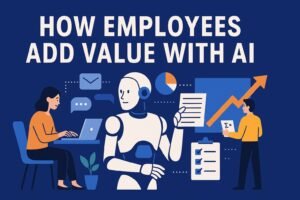As artificial intelligence continues to reshape business operations, employees are finding more ways to add value with AI. From automating repetitive tasks to backing up strategic decisions, AI has become a reliable partner in boosting productivity and growth. But not everyone feels confident. Some employees feel anxious about using AI or worry they’ll fall behind. That’s why even small, simple uses—like having AI fix the tone of an email, clean up grammar, or help solve an Excel formula—can help individuals stand out in today’s workplace. Smart Machine Digest looks at how people and organizations are adjusting to AI on the job and what that means for the future of work.
Driving Productivity with AI Tools
AI is already having a big effect on how productive employees can be. According to reports from Exploding Topics and The Social Shepherd, AI tools are expected to increase productivity by 40% in 2025. More than 80% of workers say they do better work thanks to AI-assisted processes.
Why? Because AI can handle the time-consuming stuff—data entry, scheduling, and document generation. That frees people up to focus on tasks that actually require judgment and creativity. It’s a win for the employee and the employer.
Work-life balance gets better, too. When AI takes on repetitive work, employees aren’t stuck doing overtime. That saves money and reduces burnout. And when productivity and internal mobility improve, it often means better retention and more engaged teams.
Personalized Career Development and Internal Mobility
AI isn’t just about operations anymore. It’s helping employees grow. Personalized learning and tailored career paths are becoming the norm. By 2025, around 70% of employees will expect AI to guide them on things like promotions, reskilling, and internal career moves.
This shift is already making a difference. According to Hirebee AI, companies that use internal mobility tools powered by AI have seen a 20% jump in retention. People stick around when they feel supported in growing their careers.
Still, it’s not just about the tech. AI might highlight the right training or role, but human managers are key. They connect the data to real conversations and development that feels authentic. When managers stay involved, performance data and employee growth work together.
The Business Case for AI in HR
Employers are investing heavily in AI when it comes to managing talent. By the end of 2025, more than 80% of companies are expected to use AI in workforce planning. From hiring to performance management, AI is reshaping how companies approach HR.
AI software can sort through resumes, detect burnout risks, and pick up on team dynamics that might hurt productivity. Some tools can even flag when a worker might be thinking of leaving. McKinsey says these proactive strategies can cut attrition by up to 35%.
That said, AI is only as strong as the data behind it. Clear data practices and thoughtful oversight matter—especially when interpreting human behavior. Without that, the insights can fall flat.
To see more, check out AI in HR Transformation.
Smarter Decision-Making Through Data Insights
AI isn’t just a tool for doing more—it’s changing how decisions get made. With access to real-time insights and predictive analytics, employees can now act on data that used to be out of reach. Teams are using these tools to spot trends, understand customers, and spot inefficiencies fast.
Instead of guessing or relying only on past experience, workers are offering strategies backed by real-time data. That leads to smarter planning and better outcomes.
Glyn Roberts, CTO of Vention, puts it like this: AI lets organizations tap into data they used to overlook. That means sharper insights and better decisions across the board.
But one thing’s clear—how companies use that data matters. Nearly 60% of employees report higher turnover at companies that weren’t upfront about collecting or using worker data. Transparency is key.
Future Outlook
Going forward, employees who use AI—even in small, everyday ways—will have a serious edge. Using a chatbot to check your email tone, translate a quick phrase, or help troubleshoot an Excel issue is now a baseline skill.
AI will continue helping companies work smarter and leaner. Personalized development tools are redefining how people move within companies. And as AI supports sharper decision-making, teams that understand how to use it will lead the way. The future belongs to workers who embrace these tools and still bring their own insight to the table.
To learn more about how AI supports operations, see AI in Manufacturing.

